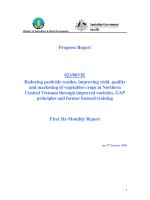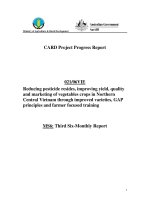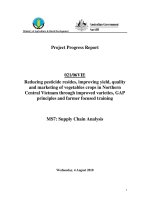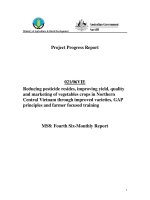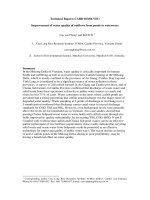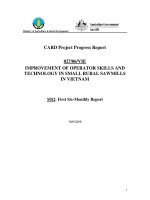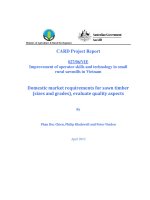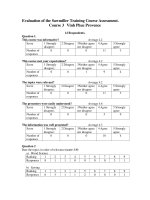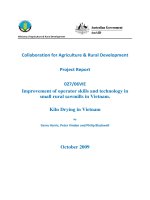Báo cáo khoa học nông nghiệp " IMPROVEMENT OF OPERATOR SKILLS AND TECHNOLOGY IN SMALL RURAL SAWMILLS IN VIETNAM " MS2 pptx
Bạn đang xem bản rút gọn của tài liệu. Xem và tải ngay bản đầy đủ của tài liệu tại đây (86.98 KB, 16 trang )
1
Ministry of Agriculture & Rural Development
CARD Project Progress Report
027/06/VIE
IMPROVEMENT OF OPERATOR SKILLS AND
TECHNOLOGY IN SMALL RURAL SAWMILLS
IN VIETNAM
MS2: First Six-Monthly Report
30/8/2008
1
Table of Contents
1. Institute Information 2
2. Project Abstract 3
3. Executive Summary 3
4. Introduction & Background 4
5. Progress to Date 5
5.1 Implementation Highlights 5
5.1.1 Inception meeting 5
5.1.2 Survey 5
5.1.3 Australian Study Program 5
5.1.4 Advisory Group Meeting 6
5.1.5 Training course (North) 6
5.1.6 Training of trainers 6
5.1.7 Training course (Central) 6
5.1.8 Sawmill and Furniture Industry site visits 7
5.2 Capacity Building 7
5.3 Project Management 7
6. Report on Cross-Cutting Issues 7
6.1 Gender and Social Issues 7
7. Implementation & Sustainability Issues 7
7.1 Issues and Constraints 7
8. Next Critical Steps 8
9. Conclusion 8
2
1. Institute Information
Project Name
Improvement of operator skills and
technology in small rural sawmills in
Vietnam.
Vietnamese Institution
Forest Science Institute of Vietnam
Vietnamese Project Team Leader
Dr Doan Van Thu
Australian Organisation
The University of Melbourne,
Australian Centre for Advanced Wood
Processing.
Australian Personnel
Professor Peter Vinden
Date commenced
23/5/2007
Completion date (original)
March 2009
Completion date (revised)
March 2009
Reporting period
Contact Officer(s)
In Australia: Team Leader
Name:
Professor Peter Vinden
Telephone:
03 8344 5238
03 5321 4113
Mobile: 0407 554 11
Position:
Chair Forest Industries and
Director of Research CRC Wood
Innovations
Fax:
+61 (3) 9349 4172
Organisation
The University of Melbourne,
Australian Centre for Advanced
Wood Processing.
Email:
In Australia: Administrative contact
Name:
Philip Blackwell
Telephone:
+61 (3) 53451021
0429487886
Position:
Research Fellow
Fax:
+61 (3) 53451021
Organisation
The University of Melbourne,
Australian Centre for Advanced
Wood Processing.
Email:
In Vietnam
Name:
Dr Doan Van Thu
Telephone:
84-4-8 362 232
Position:
Deputy Director General
Fax:
84-4-8 389 722
Organisation
Forest Science Institute of Vietnam
Email:
3
2. Project Abstract
3. Executive Summary
The goal of the project is to improve the efficiency and profitability of rural sawmills in
Vietnam and their contribution to rural development and poverty alleviation. A wide range of
stakeholders and interest groups were consulted at the start of the project at an inception
meeting to inform attendees of the project and seek input on industry problems and needs
that can be used in detailed design and implementation. This first step has established a
network of stakeholders who are consulted in relation to the project objectives. The challenge
for the project is to transfer skills and knowledge from the academic and researcher level in
Vietnam and Australia to, and in a form suitable for rural saw millers. Australian researchers
have visited Vietnam three times over the reporting period. The first visit in May 2007,
culminated in an inception meeting that has been reported. The second visit focused on
development and initial testing of the sawmill survey questionnaire. The third visit was to
undertake the training of the trainers and conduct two of the sawmiller courses.
The inception meeting of 23 stakeholders from industry, education and research institutes,
government, bilateral and multi-lateral aid agencies has agreed on the objectives of the
program and identified in detail the key requirements to be included in the survey of small
community sawmills. Questionnaires for each key stakeholder were completed, reviewed,
finalised and tested to ensure that the information gathered was relevant unbiased and useful
to the objectives of the project.
Fieldwork for the survey could not commence until the University of Melbourne approval
was obtained (February 2008). The Survey was completed prior to the third visit in July
2008. Analysis of data obtained from the survey is underway and will be completed by
October 2008. An intensive study course for 7 Vietnamese researchers was held in Australia
between 28
th
August and 3
rd
October 2007. All of the objectives set out for the training
program have been achieved.
Two of the three required training courses for sawmillers’ have been completed plus a
training course for the trainers.
The establishment of fast growing plantations of mostly Australian species has largely
substituted for a substantial reduction in logging of native forests in Vietnam.
Concurrently there has been a proliferation of small rural sawmills sourcing their logs
from the new plantation estate to meet the growing demand for forest products for the
construction and furniture industries. However, these small sawmills are unsuitable for the
species and small log sizes now coming from plantations. They are inefficient, use
untrained ex-farmer labour, produce poor quality outputs and have very unsafe
workplaces. There are currently few means of training sawmill owners or operators, or of
introducing or testing more appropriate technologies. Despite these problems small rural
sawmills are very important contributors to rural economies in many regions. The goal of
the project is to improve the efficiency and profitability of rural sawmills in Vietnam and
their contribution to rural development and poverty alleviation. A wide range of
stakeholders and interest groups have been consulted in the development of a rural
sawmill survey, the field work of which has identified the need for an on going sawmill
improvement program.
4
4. Introduction & Background
The project aims to address two major gaps in capacity in the Vietnamese industry, the lack
of skills and experience of sawmill operators in most aspects of timber processing and mill
management, and the inadequacy of current technology to meet reasonable market standards
and requirements. The Australian participants have been selected for their long experience in
development of rural sawmilling in Australia and other countries.
As a relatively small, short term project there is a need for precise focus and well-defined
project boundaries. This project will limit itself to small rural sawmills that process mostly
acacias from plantations, a resource in which Australia has special expertise. This is a
substantial and growing sub-sector of the sawmilling industry that will not be covered by
other projects, which are more concerned with processing timber from native forests.
Implementation methodologies
The goal of this project is to improve the efficiency and profitability of small rural sawmills
in Vietnam and their contribution to rural development and poverty alleviation. The starting
point was to hold an inception meeting with stakeholders in Vietnam and to establish an
advisory committee to overview, monitor and regularly evaluate progress throughout the life
of the program. This committee includes representatives of the wood processing industries,
the plantation growers, other related projects, and appropriate government agencies. The
meeting also developed an operational plan and assigned specific responsibilities to
Vietnamese and Australian collaborators.
Project objectives
The project objectives are to:
1 Identify and define industry problems, needs and opportunities through a
comprehensive survey and review the rural saw-milling industry.
2 Establish a facility for training and technology development.
3 Develop and conduct training programs to improve operator saw-milling and business
skills for trainers and for mill operators.
4 Investigate, demonstrate and recommend more appropriate or alternative technologies
to improve industry performance.
5 Develop long-term strategies for industry development.
To achieve the stated objectives:
An industry survey and review has been undertaken by a joint Vietnam/Australian team in
representative provinces, in cooperation with provincial Departments of Agriculture and
Rural Development. The survey was conducted in the form of a participatory rural appraisal
(PRA). Individual mills were visited and the following types of information sought from
owners: log volume input, sawn wood output and grades, price and cost data, market,
equipment used, employee statistics, problems identified by owners, and owners views on
development needs of industry. A complementary survey has been undertaken to include
plantation growers to assess their views on markets and prices, and sawn timber buyers, to
assess their views on sawn wood products purchased. The results are now being collated and
interpreted with the input of economists, published and used to develop and target training
and to refine project objectives and detail further methodology.
5
5. Progress to Date
5.1 Implementation Highlights
5.1.1
Inception meeting
The minutes of this meeting are included in Appendix 10.3.1.
The inception meeting was held at FSIV on the 17
th
May 2007. The twenty one participants
were very excited by this project and useful feedback was obtained. Some discussion was
centered on the scope of the project and a desire to expand it from concentrating on the small
rural sawmilling sector. Most participants felt that the proposal was sufficient and
comprehensive enough to cover the initial needs of this sector of the Vietnamese industry.
During this initial visit to Vietnam, Professor Peter Vinden, Philip Blackwell and John Fryer
visited Bin Dinh and inspected a number of sawmilling companies and a larger furniture
manufacturer. A meeting was also held with the vocational training centre in Quy Nhon
where arrangements were made for the Centre to host the training session later in the project.
5.1.2
Survey
During July 2007 Philip Blackwell again visited Vietnam and worked with the team from
FSIV to prepare the survey for initial trialling while he was in Vietnam. Three survey
documents were prepared (one for each of the following sectors - sawmillers, log suppliers
and furniture manufacturers). These surveys were tested in a number of enterprises in the
Phu Tho and Vinh Phuc provinces, by the team of Mr Chien, Mr Ngoc and Mr Blackwell.
Some modifications and clarifications were then made to the survey questions prior to the
final questionnaires production.
Peter Vinden then arranged for the survey to be submitted to the University of Melbourne’s
ethics committee for approval which is a requirement for all surveys undertaken as part of a
University of Melbourne project. Ethics committee approval for the survey was finally
granted on the 21
st
February 2008.
While in Vietnam, Philip Blackwell visited a number of sawmills in Phu Tho and Vinh Phuc
provinces and the new FSIV training centre in Ngoc Thanh looking at the future training
opportunities and sawmilling equipment.
Extensive work was undertaking in preparation for the Australian Training Program which
was planned for August 2007. This included visits to the Australian Embassy in Hanoi to
prepare for the visa applications of the participants.
5.1.3
Australian Study Program
Seven participants attended the study course in Australia from 22
nd
August to 3
rd
October
2007. One participant left the program after four weeks due to work commitments.
Doan Van Thu
Deputy Director, Forest Science Institute of Vietnam
Nguyen Van Dinh
Forest Industry Research & Technology Transfer Centre, Forest Science Institute
of Vietnam
Nguyen Thi Phuc
Forest Industry Research & Technology Transfer Centre, Forest Science Institute
of Vietnam
Bui Duy Ngoc
6
Forest Products Research Division, Forest Science Institute of Vietnam
Tran Huu Thanh
Department of Agriculture & Forestry Products Processing and Salt Production,
Ministry of Agriculture and Rural Development,
Tran Van Hoan
Vocational School for Agriculture and Rural Development in Central Vietnam
Nguyen Thanh Tung
Component Processing, Trade and Marketing, Germany- Vietnam Forestry
Program.
The course was held over six weeks and based at the University of Melbourne’s, Creswick
Campus. The participants were exposed to a large range of capacity building activities
including Anti sap stain and Preservation, Business planning, Composite Products,
Holmesglen TAFE field trip, Leadership, Occupational Health and Safety, Project Planning
and Management, Saw Blades and Sharpening, Sawmilling Principles and Practice,
Teamwork, Timber Drying, Timber Resources, Timber Specification and Manufacturing,
Tour of ACAWP and Research activities, Tour of Plantations, Canberra field trip,
Weyerhaeuser Sawmill field trip, Wood Science and Work Place Training The full program
is in appendix 11.4.4
5.1.4
Advisory Group Meeting
On the 6
th
August 2008 a meeting of the advisory group was held at the Forest Science
Institute of Vietnam in Hanoi. This meeting was well attended with continuing support
shown for this project.
A presentation explaining the results of the training section of the survey was presented and
agreement that the proposed training program was appropriate. Suggestions were proposed
of additional items to be included in the course and these where included.
5.1.5
Training course (North)
On the 11th and 12th of August 2008 a training course was held in Vin Phuc at the FSIV
Centre. The course content was based on the advisory group’s recommendation and included
presentations by Dr T.T Nghia on sawing patterns and optimization and Dr Nguyen Bich
Ngoc on timber preservation, the remaining sessions were conducted by Philip Blackwell and
translated by Pham Duc Chien and Nguyen Thanh Tung.
5.1.6
Training of trainers
On the 18
th
and 19
th
August 2008 a training session was undertaken for current and future
trainers. These sessions contained the same course content while going into greater technical
detail and presenting more information on the theory behind sawmilling and timber drying.
This course was well received and the response was extremely good. The program was
conclude with a practical session at a local sawmill, where the theory and the effects of
timber growth stresses where demonstrated.
5.1.7
Training course (Central)
On the 25
th
and 26
th
2008 August the second sawmiller training course was held at the
Vocational School for Agriculture and Rural Development in Quy Nhon. The program was
similar to that presented in the north with Nguyen Thanh Tung delivered the wood
preservation component. Philip Blackwell prepared and delivered a new presentation to
emphasise growth stresses and sawmilling techniques. Many of the sessions were attended by
students who attend the vocational training school.
7
5.1.8
Sawmill and Furniture Industry site visits
During each visit to Vietnam, Peter Vinden and Philip Blackwell had many opportunities to
visit sawmills and manufacturing facilities. These ranged from the smallest of sawmills to
larger furniture manufacturers. These visits were very informative and a great deal of
discussion was held during the visits. It became obvious that a major area of concern is
timber drying, with very few enterprises having any kilns and those that did lacked the basic
technology, experience and knowledge to satisfactorily ensure quality drying of their timber.
5.2 Capacity Building
The original CARD project had funding for six persons attending the Australian Study
Program. With the assistance of GSZ an addition member was included in the group. GTZ
supplied the airfare for Nguyen Thanh Tung and the University of Melbourne provided the
training and accommodation costs. Mr Tung proved to be a valuable member of the group
and was used as the interpreter for much of the training courses subsequently held in
Vietnam.
5.3 Project Management
An issue arose with the project management with the sudden untimely death of John Fryer,
this shocked all the project participants and caused some delays in reorganising the project.
The project management is now back on track and due for completion on time.
6. Report on Cross-Cutting Issues
6.1 Gender and Social Issues
A woman was included in the Australian Training Program. She was the team coordinator
and leader after Mr. Thu left Australia.
Each of the Vietnamese training courses included women attending the sessions. The timber
preservation session of the Sawmiller Training Courses was prepared and presented by
women. Women already play an important role in the industry but are often relegated to less
skilled tasks such as stacking. Under this project women will receive the same opportunities
for training as the men.
7. Implementation & Sustainability Issues
7.1 Issues and Constraints
To date the major issue has been the delay caused by research directives at the University of
Melbourne. These have all been completed and the personnel are now fully focused on the
completion of this project.
Minor issues relate to:
The purchase of a Portable sawmill. After some discussions it was decided that the use of a
Vietnamese manufactured horizontal bandsaw would be desirable. FSI staff are in
discussions with the manufacturers to investigate the modification of their equipment to
make it portable, also with the transport authorities as to the legality of a machine that could
be towed behind a small truck.
The performance characteristics of plantation species is at present being undertaken at the
FSIV research centre in Hanoi and the completion date for this work is unknown.
8
Output 2 includes the development of an Electronic web page designed for cluster group.
The project does not have the formation of cluster groups as part of its objectives. Cluster
groups could be a good idea to help small rural sawmillers cooperate in developing joint
project and initiaves. It is felt that these cluster groups can not be developed in the short term
and will take a great deal of grassrotts work to facilitate their development. The need for the
Electronic web page designed for cluster group is being reassessed The other issue is that
very few rural sawmillers have computers or even access to the internet and this may not
benefit the target group for this project.
8. Next Critical Steps
The next steps include:
(1) The report on the survey data which will be completed by the end of October 2008.
(2) The final training course in Vietnam will be held in September 2008.
(3) An instruction manual for sawmillers will be completed by the end of November and
available for review by the advisory group in December 2008.
9. Conclusion
The project has been delayed and is now back on track and due for completion in April 2009.
The inception meeting brought together all parties interested in the development of rural
sawmills. The meeting was valuable for all stakeholders and crystallised what was needed in
terms of the information that needed to be gathered as well as the protocols needed to ensure
the conduct of a successful survey. Of necessity the questionnaires are very detailed. and will
provide a platform for assessing long-term directions for the industry as well as providing a
base from which stakeholder beneficiaries can be assessed.
The training courses both in Australia and in Vietnam were very well received with the
participants giving positive feedback and claiming to have gained extensive knowledge and
understanding on the issues related to sawmilling.
9
MINUTES OF THE INCEPTION MEETING
(Card project 027/06/VIE)
IMPROVEMENT OF OPERATOR SKILLS AND TECHNOLOGY
IN SMALL RURAL SAWMILLS IN VIETNAM
Venue: Seminar room, Forest Science Institute of Vietnam
Dong Ngac, Tu Liem, Ha Noi, Vietnam.
Time: May 17, 2007, 8.30-12.30 am.
Chairman: Mr. Doan Van Thu
(Deputy Director General of FSIV, Vietnamese Project Leader).
Secretary: Dr. Pham Duc Chien,
(Head of International Co-operation Section of FSIV, Coordinator of the
Project)
Participants (list included)
Opening the Inception meeting
Mr. Doan Van Thu (Deputy Director General of FSIV, Vietnamese Project
Leader) started the Meeting. He welcomed participants and introduced the
reasons for implementing the Project, the purposes and contents of the
inception meeting.
Introduction of the project
Mr. Philip Blackwell (Melbourne University, staff of the Project) showed the
presentation (power point):
• Some activities of sawmill and wood processing in Australia;
• Objectives and methodology to implement the Project;
• Discussion on how to implement the project: survey, training,
long term strategy for the development of sawmills, writing
annual and final report.
Mr. Nguyen Quang Trung (Director of the Forestry Industry Centre of FSIV,
staff of the Project) showed his presentation “Overview the wood processing
industry in Vietnam” (power point).
- Trung talked more details about the need and importance of the Project: VN
currently has a lot of sawmills, particularly in rural areas, but most of them are
small, and their equipments are old, ineffective and unsafe…Most of workers
are not trained or well trained. However, these sawmills are very important in
terms of contributing to the wood processing and to improve living conditions
10
of the local people. Trung also talked about the objectives and contents of the
Project and asked participants to discuss and comment about them, particularly
the plan and method to implement the survey and training.
Field survey plan and discussion
Dr. John Fryer (Australian volunteer working at FSIV, staff of the Project):
He presented several ideas to implement the survey (by power point), and
asked people to give comments.
- The survey will probably be carried out in 4 selected provinces (Binh Dinh,
Quang Tri, Phu Tho and Dong Nai). The Project should obtain the cooperation
of the local authorities in order to carry out a survey and identify the sawmills
in the region. For instance, Binh Dinh authorities will provide with
characteristics of big and small sawmills in the region. It is also very important
to know the system of sawmills and also the ideas of sawmill owners and
workers in other provinces.
- John also raised a question that how many samples should be suitable for the
survey.
His idea: 3-4 sawmills/area?
90-120 sawmills/total?
How to select sawmills? Hope provincial institutions can help with this issue?
John suggested a format of a questionnaire (Power point).
Philip Blackwell suggested that information on model equipment, sources,
fulltime or part time should be collected.
Dr. Nguyen Phan Thiet (Lecturer of Forestry University of Vietnam):
Should emphasize on the objectives of the survey. What are criterion for
selecting sawmills and the regions where sawmills locate?
Dr. John Fryer (answer):
- The survey is very important, because based on the results achieved; we will
plan and carry out training programs, also to improve technologies.
- Unless we know what technologies they are using and its efficiency, we can
not deliver any valuable suggestion.
- On the other hand, VN needs confident information on technology of wood
processing, particularly on small sawmills. It is now unclear that how important
small sawmills contribute to the economy of the country.
- Information from the survey and form GTZ Project (MARD) is very
important for policy makers both in central and local levels.
Dr. Le Thanh Chien (Head of the Wood Processing Division, FSIV).
- Lack information to evaluate the efficiency and effectiveness of technologies,
characteristics of materials (note that wood in VN is different with that from
Australia and European countries).
11
- Need to add more information on characteristics of materials, rate of end use,
quality of sawn timber, technology and equipments currently using. It would be
very good if we can add more information of before and after sawing.
- In terms of selecting areas for the survey he said that these areas should have
plantations of Acacia and Eucalyptus. The survey also should cover a small rate
of big sawmills (less than 30%) in order to understand deeply the overview of
sawmills in VN.
- It is not necessary to have many samples, but should be typical
(representatives) for the region.
Information can be collected from provincial departments, e.g. Forestry,
Science and Technology, Industry.
Mr. Nguyen Quang Trung:
- The survey should add information on kinds of equipments, but not focus on
activities of before and after sawing.
- As the Project focuses on small sawmills as saying clearly from the title and
objectives, he suggested that participants should pay more attention to this
fields, also give comments on those.
Mr. Nguyen Hong Viet (GTZ project):
- GTZ has carried out its project in 4 provinces in Vietnam. In fact, each
province has its own situation and the development strategy, so that sawmills
are also different form one province to another. It is therefore important to
adjust suitable questionnaire for each region.
- The survey (proposed by John) should focus more on human resources, input
and output of sawmills…It is also important to pay attention on standard of
timbers (as currently real timbers do not match well applied standard).
- GTZ also pays some attention on re-classify standard of some kinds of
timbers, as it is now problematic to match the used standard and the real one.
Dr. Nguyen Phan Thiet
- Objectives of the project are rather clear and very interesting.
- Selected areas for the survey should be: Phu Tho and Ha Tay provinces (the
North) because Ha Tay has more sawmills than Phu Tho. Binh Dinh (the
Central) and Dong Nai (the South) are OK. However, based on the budget
approved, the project staff should discuss and decide.
- Information can be collected from tax department or statistic divisions at
provincial levels.
- The survey should focus on small (private) sawmills, but also should pay
some attention to state sawmills to see the differences.
- Thiet also suggested the survey should focus on groups including information
of: Name, input, output, technology, equipment, safety, human resources,
market, efficiency, and other.
- Still lack: capacity to use and repair equipments
Finally, he suggested that due to the project is small; we should focus on main
things, not every thing.
12
Mr. Tran Huu Thanh (Dep. Agro-forestry Products processing and Salt
Industry, MARD). He highly appreciated the objectives and contents of the
project, also contributed some information.
- His Department has data of sawmills of 64 cities and provinces (he is not
quite sure about whether the Statistic Department has such information), of
course in general. His Department plans to carry out surveys (from now to
2015) on sawmills and wood processing units in VN.
- Methods: should select samples because VN’s situation is different with that
from Australia.
- His Department did some survey in the past by carrying out an indirect
survey, sending questionnaire in advance to units of wood processing
throughout VN, collecting and analysing. However, the information is not as
detail as what we will do in this Project.
Dr. Nguyen Ton Quyen (Vice Chairman & General Secretary of VN Timber
& Forest Production Association):
- The objective of the Project is clear: to improve operator skills and
technology in small rural sawmills in VN. As the Project is not very large, we
should focus on the objectives of the Project as clearly showed from the title.
- The Project is very necessary and important for the rural area in order to
improve economy and alleviate poverty.
- Selected areas for survey should have both plantation and sawmills.
- Content and criterion of the questionnaire should be simple and should
include:
• General information on the sawmills (name, location, type of owner…);
• Information on material sources (inputs): kinds of species, diameter,
from Vietnam or imported;
• Information on outputs: purposes of outputs;
• Technology and equipments: by hand, machine or combine, kind of
equipment;
• Market (market of material and market of products);
• Human sources: skilled and unskilled workers, technicians (no need too
much detail on this field).
Dr. Nguyen Van Duc (Forest Product Preservation Research Division):
The Project is very necessary for improving living standards of rural areas, and
it is also in accordance with the wood processing strategy of Vietnam. It is also
important that the Project is as a bridge for Vietnam and Australia to learn and
exchange knowledge and technology each other.
- Survey should add some more information on safe conditions and wood
decay.
- If possible, the Project should have a demonstration model for local people to
visit and learn.
13
Training plan and discussion
Dr. John Fryer: presented training issues that will probably carry out by the
Project (included in the project proposal).
- Selected trainees for the training course organized in Australia (training for
trainer): Experience in sawmills, continue to work on sawmills after training
course. Selected trainees should have some English (but not too important).
- Trainees (6) should be selected from FSIV, Forestry University of VN and
Vocational Training Centres. These trainees will be sent to Australia for
attending a training course, and then return to VN to develop program and
teach in Vocational Training Centres for other trainers.
- How to select suitable candidates for each training course? How to attract saw
millers and workers to the training course?
- As the budget for training is limited, how to organize good and effective
training courses? Can we get some fund from other sources?
- Criterion for selecting trainees attended courses in Australia? Suitable
qualifications, not too old, have some English?
- Skills focus on:
• Evaluate material sources and products (inputs and outputs)
• Design diagram of saw-cut
• Techniques of sawing
• Skills to repair equipments
Dr. Le Thanh Chien
- Training is very important as it is a key issue to improve quality and quantity
of products and by these ways to increase incomes for the sawmill owner and
workers.
- Should pay attention to the sustainability of the training organizations. These
organizations will be able to continue the training after the end of the project.
The organizations should be the Vocational training Centres, Centre of forestry
extension, Centre of industry extension.
- As the budget for training is limited, we should find ways to organize good
and effective training courses for trainees. We also should pay attention to
demonstration and evaluation of the results.
Philip Blackwell
- Suggested that local people can use media (free or very cheap) such as CD or
VDO to learn new knowledge and technology.
Dr. Nguyen Ton Quyen
- Training is very important.
- Should learn results and experience for GTZ project in terms of training style
to share responsibility in organizing training. Sawmills are responsible for basis
needs (class room, equipments…), and GTZ are responsible for teaching, text
books…
14
- The Government pays a great attention to training (via General Department of
Vocational Training). We therefore should contact this organization to get help
and cooperation.
- A good training course should include theory and practices (particularly
practice of operating equipments and machines…).
Mr. Nguyen Hong Viet (GTZ)
- It is a waste of money and time if trainers trained from Australia could not
apply knowledge and skills learnt in VN.
- Small sawmills are not very stable as they are under a great influence from
social factors. So, their agreement with the Project is also not so stable.
- On the other hand, big sawmill or wood processing units are more stable.
- Therefore, we can also send participant from big enterprise to go to Australia
for training.
Advisory committee, its role and function
Mr. Doan Van Thu
- Mr. Thu raised a question whether the Project should have an advisory
committee? Participants agreed to have an advisory committee. However, due
to the Project is not very large, so the committee should not very large, and
may include:
1. Mr. Doan Van Thu (FSIV)
2. Mr. Nguyen Quang Trung (FSIV)
3. Dr. Nguyen Ton Quyen (VNTFPA)
4. Dr. Pham Van Chuong (VFU)
5. Mr. Nguyen Ngoc Thuy (MARD)
The activities of the advisory committee will be volunteer, and following the
request of the project staff.
Mr. Doan Van Thu (Conclusion and close of the Inception Meeting).
Mr. Thu highly appreciated the participation of all members also their
contribution to the Inception Meeting. He also summarized the main issues that
had been discussed as follows:
1. The survey:
- The survey should be implemented in 3 provinces: Phu Tho (the North), Binh
Dinh (the Central) and Dong Nai (the South).
- Based on the results of the survey, small surveys can be carried out in other
places to add more information (e.g. in Quang Tri, Ha Tay provinces…).
- Sources of information on sawmills can be collected from Mard, provincial
department of science and technology, provincial department of agriculture and
rural development, centres for forestry extension and centres for industry
extension and other relative projects.
- The number of samples are around 30 samples (sawmill) per one province.
- Important information should include:
15
• General information on sawmills:
• Capital situation: how much, from itself, loan, or others…
• Plan of activities: full or part-time, having extent of activities, what
level?
• Equipments: name, classification, amount, quality, time of manufacture,
plan for maintenance, new purchase…
• Timber sources: where to supply, quantity, quality, enough for the
sawmill production, having any problems of stain for decay?
• Classification of timber: what species, amount, quality
• Outputs: purposes of outputs, quantity and quality, rate of products
compare with the waste
• Wood waste: rate and the use of wood waste
• Workers: trained or untrained, working full or part time, ages, sex…
• Safety: safe conditions, accidents happened…
• Interests: Like to attend any training course, like to share any activities,
having any plan to train workers…
• Other ideas or comments
2. Training
- Send 6 participants (FSIV, VFU, MARD, VTC) to attend a training course in
Australia.
- Cooperate (FSIV, MB, VFU, MARD, VTC and other institutions) to organize
training courses in VN.
3. Establish the advisory committee
Agreement of proposed members, the committee will work as volunteer as
required from the project staff.
On behalf of the project staff, Mr. Thu thanks all participants and hopes to
continue receiving cooperation and help from participants.

